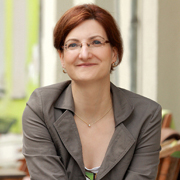Charlotte Seither has composed two ensemble works for voices for the BBC London and the Norddeutsche Figuralchor.
What is this “I”?
Twenty-four vocal parts, positioned within the orchestra, form sound shadows to the instrumental parts. In her composition Language of leaving for the BBC Singers and the BBC Symphony Orchestra, Charlotte Seither poses the question about the physical quality of a sound, whether vocal or instrumental, and the range of its identity. She uses a text by the Baroque poet Francesco de Lemene which deals with a transition, with the question of identity: “I leave, die. But your hopes, what becomes of them: will them remain or go?” The text asks about the thoughts and visions of the subject, whether these are present independent of the physical existence. “I find the intellectual approach modern. What is this “I”: is it my physical presence, is it the temporality in which I stand and pass away, is there an independence of my thoughts from that which I am, or is my entire being merely a fiction of me myself? This opens a compositional expanse into the utopian which interests me.”
The vocal sound of the British choral tradition has inspired Charlotte Seither to the conception of Language of Leaving. “It is precisely the women’s voices of the BBC Singers which have something extremely fine, distinguished, can switch to high flexibility, which is defined through an ability to articulate, and less through size and volume. A sound which has something instrumental about it, which is often found in early music, in which it’s not about dramatic exaltation, but about the reduction of this expressivity. It’s exactly for this ideal sound that I have written this piece.” The central idea is the inner echo, which, as it were, is microscopically enlarged from this, there where the boundary between vocality and instrumentality merges. “The voices are not the expression of an individual, rather the orchestra becomes a utopian expanse where the question about autonomy is posed. The orchestra is filled with the breath of the voices, is humanized and moves within this border space.” At the same time, the positioning of the twelve vocal groups in the orchestra generates a new kind of “spatialization” of the sound, for the complete merging of particular voices and instruments is increasingly dissolved through the relationship to other vocal colours. Nevertheless, voices and orchestra are constantly thought of as one. As they are positioned towards the front of the stage, everything occurs within the musical movement.
Material in space
Charlotte Seither has composed a new work for double choir for the 850th anniversary of Kloster Loccum (Loccum Monastery), based on an anonymous text from the Buch der 24 Philosophen. The work has been commissioned by Deutschlandfunk Köln. In her composition for the church at Loccum, notable for its long echo, she has used techniques of vocal polyphony in a quite unique way. “In my piece, twelve voices repeatedly converge into a unison, which subsequently opens up into 12-part polyphony. Impulses are constantly radiated, from which the acoustic of the space is stimulated, however, in the compilation, they produce something which is almost unison. The size of the church is made evident not by using the full choral forces constantly, but sparse material is placed in the space, small subjects which always emerge in other places and which are handed on through a constantly forward-flowing sound stream of the voices.”
The text from the 11th century contains a game with light metaphors and is, as it were, spatialized polyphonically. “God is the darkness in the soul which remains after all light” is the anonymous answer to the question, what is God. “A spiral construction which in the darkness at the same time follows the highest presence of light: that is an immensely attractive and compositionally fruitful intellectual game. This dialectic is not portrayed temporally, but in the polyphonic construction,” according to Charlotte Seither.
Marie Luise Maintz
(from [t]akte 1/2013)



